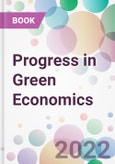Progress in Green Economics primarily focuses on developments in the transition of different industries and sectors to a sustainable, environment-friendly economic model. The book presents 7 chapters that cover different topics that reflect these developments in the field from a number of academic and practical angles.
The topics covered in the book include a review of the Food Energy Water Waste (FEWW) paradigm in Asian countries, an analysis of green economic forces in the Arctic region, green economics for protected area tourism, a conceptual analysis of green economics strategy, sustainable development and green banking in South Africa, and six sigma methodology for implementing green economic policies in different industries. Each chapter is organized into reader-friendly sections and is supplemented with references for the benefit of more involved scholars.
The multi-regional perspectives, along with the theoretical and practical information on the topic make this reference a timely and handy resource on green economics and sustainable development for academics, scholars, industrialists, policymakers and economics enthusiasts alike.
Table of Contents
PREFACELIST OF CONTRIBUTORS
CHAPTER 1 THE “FEWW” NEXUS IN GREEN ECONOMICS FOR ASIAN COUNTRIES
- Hari Srinivas
THE FEWW NEXUS
- Food
- Energy
- Water
- Waste
THE GET MATRIX FOR ACTION
- The Global-National-Local Pattern
- The Governments-private Sector-civil Society Pattern
- The Governance-Education-Technology Pattern
CONSENT FOR PUBLICATION
CONFLICT OF INTEREST
ACKNOWLEDGEMENTS
REFERENCES
CHAPTER 2 GREEN ECONOMIC TRANSITION SCENARIOS IN THE ARCTIC REGION
- Filip Lestan and Sajal Kabiraj
INTRODUCTION
LITERATURE REVIEW
- Advantages & Strengths of Scenario Analysis
- Disadvantages & Weaknesses of Scenario Analysis
- Wild Scenarios - “Black Swan”
- Scenarios in Practice - International Energy Agency
ASSUMPTIONS
- Global and National Climate Policies
- Delayed COVID-19 Recovery
- Circumpolar and Arctic Energy Policy
- Desire for Innovations
- Tradeable Instruments
- Continuity of International Relations and National Security
- Investments as Social and Environmental Costs
- Technological and Energy Development
- Total Primary Energy Demand (TPED)
- Total Primary Energy Supply (TPES)
- Fossil Fuels Production and Supply
- Fossil Fuels Demand
- Green Energy Production and Supply
- Green Energy Demand
- CO2
- Emissions
- Decarbonization
GREEN TRANSITION SCENARIOS IN THE ARCTIC REGION BY 2030
- Introduction to Scenarios
SCENARIO 1: “LIME TRANSITION”
- A Soft and Light Green Transition that is Handy but Sour, like the Fruit Lime
SCENARIO 2: “WATERMELON TRANSITION”
- A Dark and Giant Green Transition that is Notorious and Sweet, Like Fresh Watermelon
SCENARIO 3: “OLIVE TRANSITION”
- A Negligible and Minor Green Transition that is Oil-Based, Like the Oil From Olives
BLACK SWANS
- Energy War
- Global Cooling
CONSENT FOR PUBLICATION
CONFLICT OF INTEREST
ACKNOWLEDGEMENTS
REFERENCES
CHAPTER 3 GREEN ECONOMY IN THE SERVICES: THE CONTEXT OF PROTECTED AREA TOURISM
- Supriya Dam
INTRODUCTION
OBJECTIVES AND METHODOLOGY
REVIEW OF LITERATURE
A BRIEF ACCOUNT OF STUDY AREA
TOURIST VISITATION AND REVENUE EARNED AT WLS
CONSERVATION EFFORTS AT WLS
SURVEY OF TOURISTS
DISCUSSION AND CONCLUSION
NOTES
CONSENT FOR PUBLICATION
CONFLICT OF INTEREST
ACKNOWLEDGEMENTS
REFERENCES
CHAPTER 4 STRATEGIC POLICIES FOR GREEN ECONOMY: A CONCEPTUAL ANALYSIS
Mauricio Umana
INTRODUCTION
STRATEGIC POLICIES FOR GREEN ECONOMY
PUBLIC POLICY FOR WHITE SPACE INNOVATION & INNOVATION TERRITORIES
PUBLIC POLICY FOR INCENTIVES IN SOCIAL INNOVATION
PUBLIC POLICY FOR INCENTIVES IN CLEAN TECHNOLOGY AND THE BASE OF THE PYRAMID
FIRST YEAR: BUSINESS CONCEPT IN EXECUTION
SECOND YEAR: CO-DEVELOPED BUSINESS MODEL
THIRD YEAR: AUTO SUSTAINABILITY OF THE BOP POLICY
PUBLIC POLICY FOR ENERGY USE
PUBLIC POLICY FOR WATER USE
CONCLUSION
CONSENT FOR PUBLICATION
CONFLICT OF INTEREST
ACKNOWLEDGEMENTS
REFERENCES
CHAPTER 5 GREEN ECONOMY FOR SUSTAINABLE DEVELOPMENT
Michael Adelowotan
INTRODUCTION AND BACKGROUND
GREEN ECONOMY IN AFRICA
GREEN ECONOMY IN SOUTH AFRICA
GREEN ECONOMY PROGRAMMES IN SOUTH AFRICA
GREEN ECONOMY POLICIES IN SOUTH AFRICA
GREEN ECONOMY INVENTORY FOR SOUTH AFRICA (GEISA)
THE GREEN FUND
CONCLUSION
CONSENT FOR PUBLICATION
CONFLICT OF INTEREST
ACKNOWLEDGEMENTS
REFERENCES
CHAPTER 6 CASE STUDIES IN GREEN BANKING
- Varaidzo Denhere
INTRODUCTION
THE GREEN ECONOMY
GREEN BANKING
SUSTAINABILITY IN BANKING
TOP 5 SOUTH AFRICAN BANKS
STANDARD BANK GROUP
- Minimising Direct Environmental Impacts
- International Contribution
- Green Solutions in Asset Finance
- FIRTSRAND LTD
- Climate Resilience and Energy Management
- ABSA GROUP LTD
- Materials
- Energy
- Water
- Effluents and Waste
- NEDBANK GROUP LTD
- Products and Services: Sustainable Development Finance
- Operations
- Partnerships
- INVESTEC LTD
- Responsible Financing and Investing
- Responsible Asset Management
- Responsible Property Management
- Participating in Renewable Energy
- Conserving the Environment
- Direct Operational Impact
CONSENT FOR PUBLICATION
CONFLICT OF INTEREST
ACKNOWLEDGEMENTS
REFERENCES
CHAPTER 7 LEAN SIX SIGMA AS A METHODOLOGY TO IMPLEMENT GREEN ECONOMICS INITIATIVES
- Abeni El-Amin
INTRODUCTION
THE LEAN SIX SIGMA PROCESS
GREEN ECONOMICS IN MANUFACTURING
GREEN ECONOMICS IN AUTOMOTIVE PRODUCTION
GREEN ECONOMICS IN HEALTHCARE
GREEN ECONOMICS IN HIGHER EDUCATION
PROMOTING GREEN ECONOMICS
DISTRIBUTED LEADERSHIP THEORY
FOSTERING EFFECTIVE COMMUNICATION AND COLLABORATION
GREEN ECONOMICS LEADERS AS PROJECT MANAGERS
EVALUATING GREEN ECONOMICS LEADERSHIP EFFECTIVENESS
INCORPORATING INNOVATIVE LEADERSHIP
GREEN ECONOMICS FOR A GLOBAL ENVIRONMENT
CONCLUSION
CONSENT FOR PUBLICATION
CONFLICT OF INTEREST
ACKNOWLEDGEMENTS
REFERENCES
SUBJECT INDEX
Author
- Babu George - Editor








